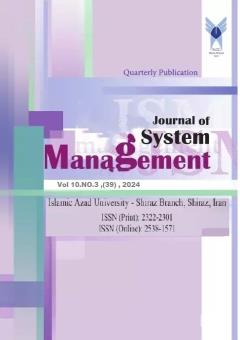The Impact of E-Satisfaction on E-Loyalty Moderated by Customer Perceived Risk and Skill (Case of Mashhad’s Mellat bank)
محورهای موضوعی : MarketingSeyed Mojtaba Moussavi Neghabi 1 , Yousef Ramezani 2 , Bahare JabarZade Nouri 3
1 - Assistant professor, Department Management, University of Gonabad, Gonabad, Iran
2 - Assistant professor, Department Management, Faculty of Literature and Humanities, University of Gonabad, Gonabad, Iran
3 - M.Sc. in Management, Faculty of Management, Attar University, Mashhad, Iran
کلید واژه: Perceived risk, Customer Skill, E-satisfaction, E-loyalty, Online Banking, Internet Banking.,
چکیده مقاله :
As the digital landscape continues to reshape the banking industry, understanding the factors influencing customer loyalty in online banking becomes paramount. This study investigates the intricate relationships between e-satisfaction, e-loyalty, and the moderating effects of consumer perceived risk and skill. Drawing on a sample of 168 customers from selected branches of Bank Mellat in Mashhad, statistical analyses were conducted using SPSS and Smart-PLS. The results reveal a direct and positive impact of e-satisfaction on e-loyalty, elucidating the fundamental role of customer contentment in fostering loyalty in the online banking domain. Moreover, the study uncovers a nuanced interplay, demonstrating that the relationship between e-satisfaction and e-loyalty is contingent on the levels of consumer perceived risk and skill. High perceived risk and low skill levels diminish the impact of e-satisfaction on e-loyalty, highlighting the need for tailored strategies for these customer segments. This research contributes to the evolving understanding of e-loyalty dynamics, emphasizing the significance of customization, security, convenience, delivery, communication, and website aesthetics in shaping customers' e-loyalty. The findings provide actionable insights for banking institutions to refine their online platforms, fostering a more personalized, secure, and engaging digital banking experience to enhance customer loyalty.
As the digital landscape continues to reshape the banking industry, understanding the factors influencing customer loyalty in online banking becomes paramount. This study investigates the intricate relationships between e-satisfaction, e-loyalty, and the moderating effects of consumer perceived risk and skill. Drawing on a sample of 168 customers from selected branches of Bank Mellat in Mashhad, statistical analyses were conducted using SPSS and Smart-PLS. The results reveal a direct and positive impact of e-satisfaction on e-loyalty, elucidating the fundamental role of customer contentment in fostering loyalty in the online banking domain. Moreover, the study uncovers a nuanced interplay, demonstrating that the relationship between e-satisfaction and e-loyalty is contingent on the levels of consumer perceived risk and skill. High perceived risk and low skill levels diminish the impact of e-satisfaction on e-loyalty, highlighting the need for tailored strategies for these customer segments. This research contributes to the evolving understanding of e-loyalty dynamics, emphasizing the significance of customization, security, convenience, delivery, communication, and website aesthetics in shaping customers' e-loyalty. The findings provide actionable insights for banking institutions to refine their online platforms, fostering a more personalized, secure, and engaging digital banking experience to enhance customer loyalty.


